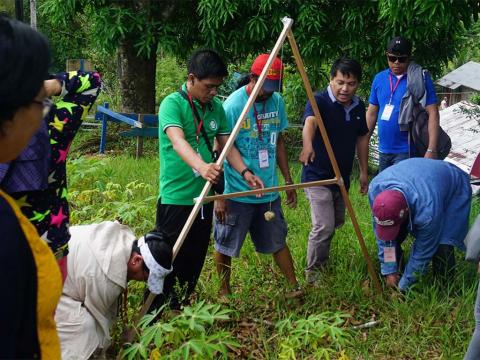Participants during the actual demonstration on the use of “A” Frame with Neptali Madarimot from ATI-Caraga as mentor.
SURIGAO CITY, Surigao del Norte – A total of twenty-five (25) individuals comprising farmers and Agricultural Extension Workers (AEWs) attended in the Training on Sustainable Corn Production in Sloping Areas (SCoPSA) on June 3 – 5, 2019 at Parkway Hotel, Surigao City.
SCoPSA is a program developed by the Department of Agriculture as part of the national advocacy to adopt soil and water conservation measures for sloping areas.
It aims to harmonize corn production, soil and water conservation, restore and improve land use, reduce soil erosion, and contribute to the production of quality corn and food staple sufficiency program.
Neptali V. Madarimot, ATI Corn Focal Person gave an overview of the Sloping Agricultural Land Technology (SALT), soil conservation and management practices as well as the guidelines and protocol of SCoPSA. On
the other hand, Segundino R. Cagas, Provincial Corn Coordinator discussed the Integrated Pest Management (IPM) and the Proper use of herbicides and Pesticides.
Hands-on and field practicum on the proper way of building and using an A-frame, a simple tool made from wood or bamboo for laying out the contour lines across a slope was also conducted during the training. These was followed by the collection of soil samples and identification of hedges.
Jonathan A. Escudero, a farmer from Surigao City was thankful to the facilitators specifically to the ATI for bringing the technology to the farmers. “The use of ‘A’ Frame for the proper use of contour strips to prevent soil erosion is the best knowledge that interest me. I am delighted with the learning gained in asexual propagation in this manner I can propagate a good quality fruits trees in my own farms”. Escudero added.
After the lectures and discussions, the participants prepared their own community plans on the establishment of a Techno-Demo on SCoPSA in their respective areas to disseminate the technologies to other farmers.

